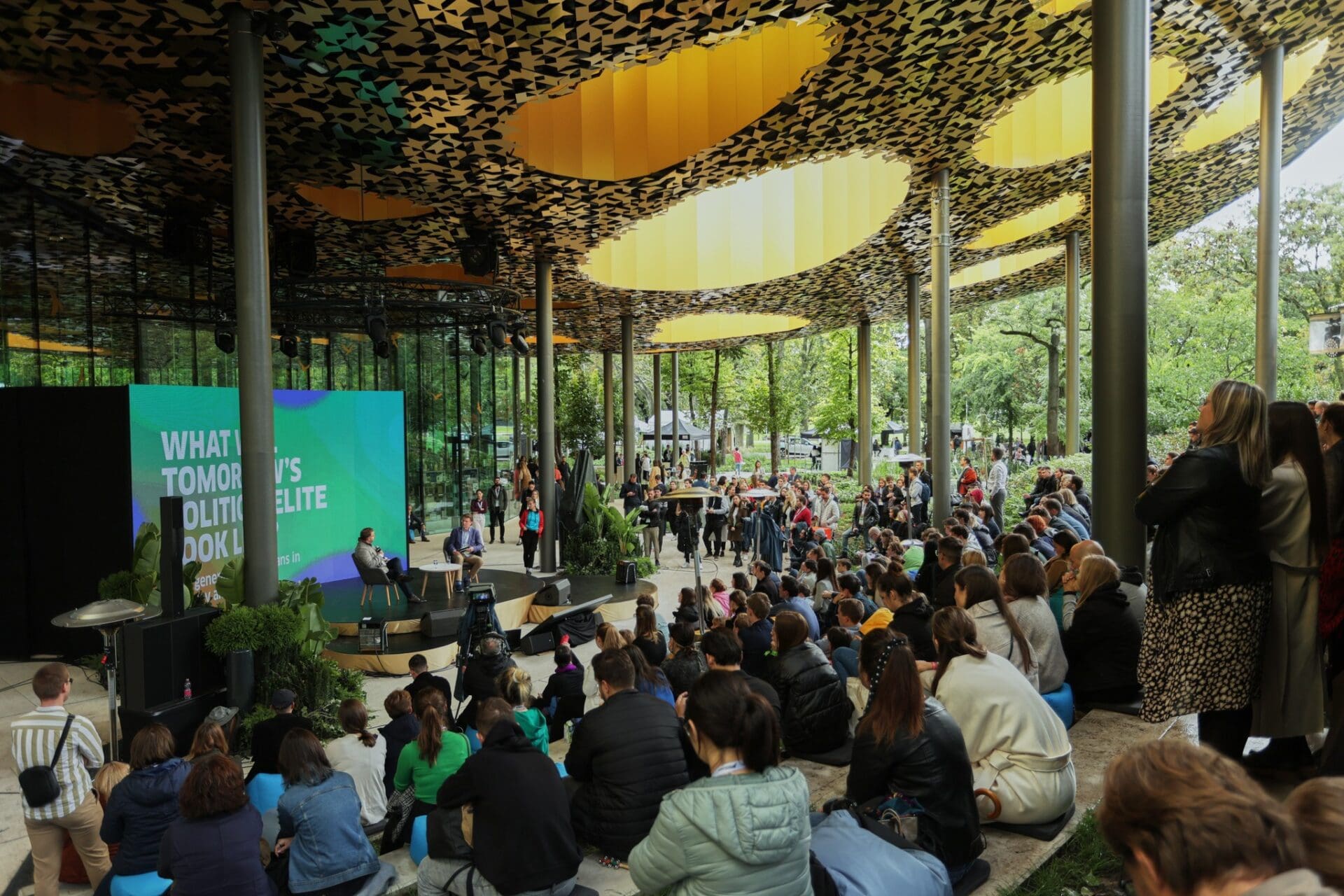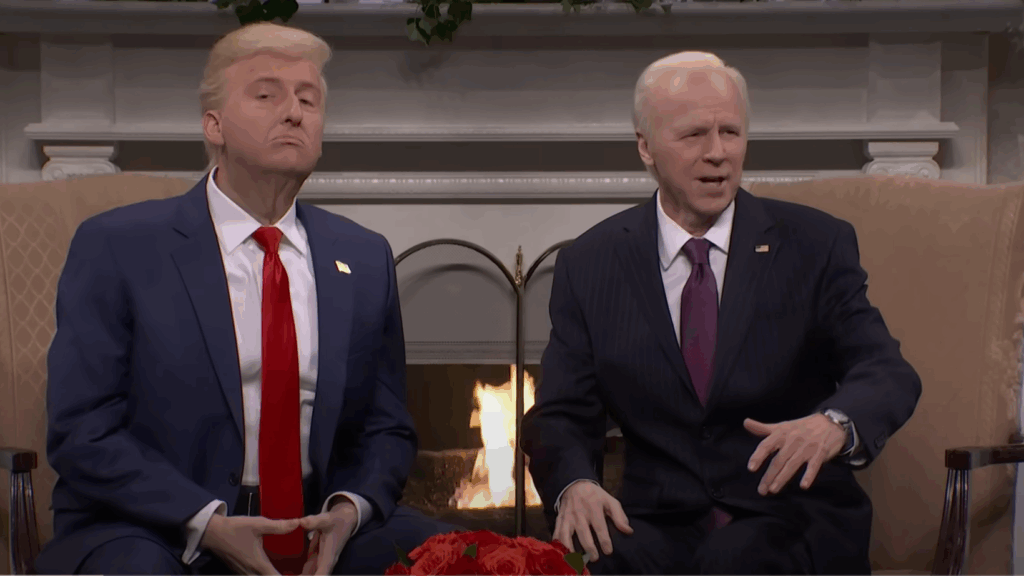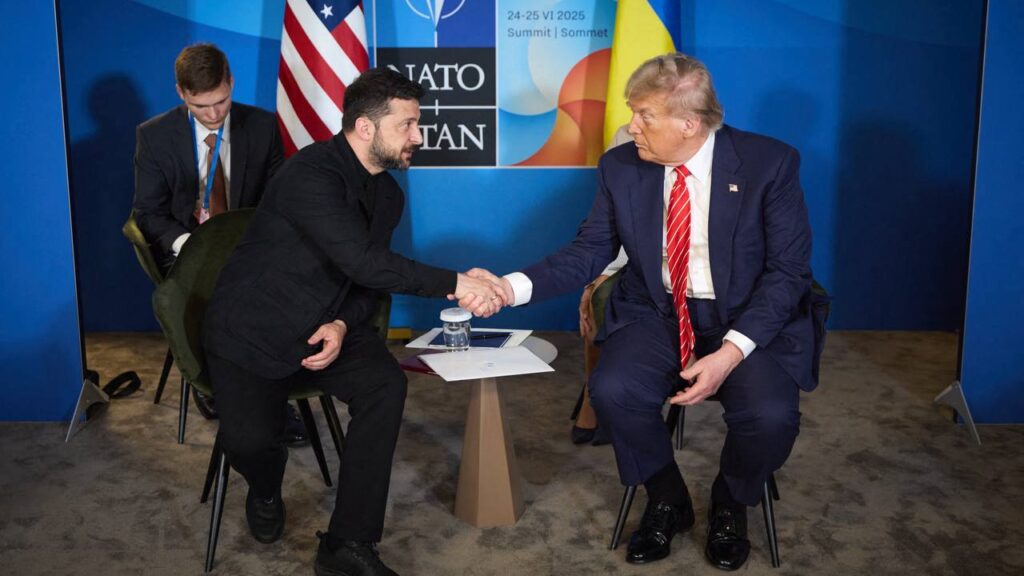The discussion was hosted by British diplomat Iain Lindsay, former Ambassador of the United Kingdom to Hungary, who now serves as advisor to the Economic Development Board of Bahrain. His guest was Balázs Orbán, a lawyer, politician, scholar, university lecturer and Political Director of the Prime Minister. Mr Lindsay queried his interlocutor about what tomorrow’s political elite will look like in his opinion, as well as whether there are any special characteristics that define Hungarian politics and politicians.
How do you manage to keep in touch with ordinary people your age who are not involved in such high echelons of politics?
First of all, even though it would be ridiculous to say I am not a politician, in my heart and in my inner circle I am probably not one. It is a mere coincidence I ended up here. I simply started and academic career that turned toward politics. At one point in my life, it became part of my job to be involved in politics, and as fate would have it, I ended up in the middle of it. I still, however, put a lot of effort and energy into keeping a real-life connection with young people. I teach and hold lectures at MCC (Mathias Corvinus Collegium) and several universities. These things give you credibility in real life, you get both positive and negative feedback that help you stay grounded. I also believe it is important to literally ‘walk the town’. Since I grew up in downtown Budapest, I enjoy walking in the city, especially at night. I think it helps my political thinking. I like to clear my head—walk around the city centre, eat a kebab, walk to a metro station, buy a newspaper, ride the metro and so on. I try to do this on a daily basis. This is definitely another thing that helps me stay grounded and connected to life.
I must be important to get a feel for everyday life, especially when you spend all your day with people of the calibre of Viktor Orbán.
Of course. And these walks help a lot. I believe that architecture is also very important. Budapest is a perfect location, because it is visually pleasing. Just look at the venue where we are now. [The House of Music Hungary is a unique and complex institution of musical initiation that opened its doors in the City Park in January 2022. The iconic building that Hungarian Conservative has also showcased was designed by Japanese star architect Sou Fujimoto.] There are also three trends to follow in Hungarian architecture. We have buildings that were destroyed by foreigners in the past. We of course need to rebuild these to the best of our abilities because they are part of our heritage. The other trend is to invite talented foreign architects to the country. In the past centuries when Hungary was flourishing our leaders invited wonderful architects to embellish Hungarian cities with their own style of architecture—the House of Music is a great example. It is reasonable that a legendary architect like Fujimoto should have a building in Budapest. The third way to move forward is to work out architectural trends that represent Hungary in the 21st century. This in my opinion is the most important intellectually.
We need to talk about the future political elite. Are there any Hungarian characteristics in politics? Perhaps compared to other European politicians?
There is and has to be a clear dividing line in politics, not only in Hungary. The old political line was between the right and the left, and this does not mean that there is no dividing line in Western politics. Everything is about how one represents one’s community. You have to have a clear idea—the dividing line is between those who claim they represent something bigger than a nation: Europe, Western civilization or humankind for example, and those who proudly represent their nation and all their decisions stem from that idea. Hungarian politicians are more based, more ‘black and white’ in this regard. The world is complex and global issues are not easy to solve, however, our responsibility is to the Hungarian people not to other nations. What’s good for the people is good for us, and what’s bad for the people is simply just not acceptable for us. Thus, I think that the dividing line in Hungary is very visible.
Isn’t there a risk of taking a strong position on putting a country’s citizens first? Doesn’t it make it harder for Hungarians to be leaders in a European context coming from a national perspective?
Of course, leading with this kind of thinking is always a challenge. I can give you two answers. The Hungarian, and the global one. The Hungarian answer is that without strength in politics you can be on the good side of history, but you will never achieve your goals. You must be committed to protecting your position or else you will fail. For the global answer, let me give you a football example. In a stadium filled with 70,000 Hungarian fans [a reference to the 26 September football match in the Nations League tournament between Hungary and Italy in Budapest], there was clapping and cheering during the Italian national anthem. The Italians were surprised—if you are proud of your nation, it does not mean that you have to think you are better than others and condemn other nations. A proud nationalist can be fair and unbiased and have a balanced position regarding others. This way of thinking is a good starting point for cooperation and creates a good world order.
Talking about the need for power to make decisions, there are people who only have experience in politics, while in America a lot of businesspeople who can be considered amateurs are getting involved in politics. In your opinion, which is better? To be a professional politician, entering the world of politics straight after university, or to have other types of professional experience as well?
For political opponents, we need amateurs. But jokes aside, I have met with people coming from other elites throughout my career. As a Hungarian, it is weird, or even suspicious to see people who are made of ‘plastic’ and are not ‘rock solid’. We like politicians with a deep understanding of and critical thinking about the world around us. Of course, in Hungary we can see examples for both cases. The prime minister started his political career when he was 25, right after university. In my opinion all of Hungary’s best politicians were always intellectuals first. If you want to be a politician as a child, it is harder to accomplish it. As opposed to that, if you are an intellectual in Hungary, sooner or later you will end up in politics. Intellectuals who want to shape the future of their countries will have to get involved in politics. Whether you are a lawyer, a dentist, or any other professional, it doesn’t really matter—doing politics is part of the mission of a Hungarian intellectual. Even if one is not a professional politician, it is a duty for most Hungarians to take on broader responsibilities. If we look at Hungarian history, all our famous people—poets, artists, et cetera—had a point in their lives when they became involved in politics. While for example in the United Kingdom this is not the case.
What is your relationship with the prime minister? Is your advice to him dictated by his personality?
First of all, let me clarify that we are not related. When I talk at international events I like to start by saying ‘I want to say two scary things. First, that I am from Hungary, and second, that my last name is Orbán.’ On a more serious note, however, it is weird when people call me his advisor. Honestly, I am 36 years old, and he is 60. He has been in politics for about 32 years, spending 16 in the opposition and 16 as prime minister. I have been in politics only six or seven years, so it is ridiculous to say that I advise him. However, he is very open toward the younger generations. He always helps young people get involved in politics. He enjoys training them to be successful patriotic politicians. This is the key. We Hungarians need to be able to help the younger generations understand the geopolitical interests and the way of thinking that we follow. I am of course formally a chief advisor; however, I am the one learning from him and I am grateful for that.
Hungary as a country, and even its language, is unique. Looking ahead—will Hungary in the future be suspicious of others telling it what to do?
That is certainly part of Hungarian thinking. Although we are in the middle of Europe, culturally we represent an island. No other nations around us have similar experiences in history. The Hungarian way and strategy used to be part of European life. However, after the Ottoman occupation we disappeared from the international arena. Then came the Habsburgs, and later the monarchy in which Austria and Hungary had a common foreign policy, but it wasn’t a Hungarian policy. Then came World War II and the Nazis, and finally the Soviets for forty years. The Hungarian way of thinking is not unknown because others do not like us, it is unknown because they never heard of it, as we never had the chance to show it to them. We should be able to explain our way of thinking to others and be strong enough to hold onto it firmly. This is a job for the current generation of political elites; however, it could very well be on the agenda of the generations to come, too.








